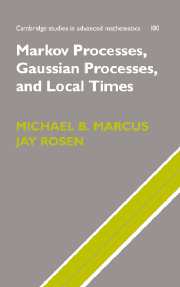Book contents
- Frontmatter
- Contents
- 1 Introduction
- 2 Brownian motion and Ray–Knight Theorems
- 3 Markov processes and local times
- 4 Constructing Markov processes
- 5 Basic properties of Gaussian processes
- 6 Continuity and boundedness of Gaussian processes
- 7 Moduli of continuity for Gaussian processes
- 8 Isomorphism Theorems
- 9 Sample path properties of local times
- 10 p-variation
- 11 Most visited sites of symmetric stable processes
- 12 Local times of diffusions
- 13 Associated Gaussian processes
- 14 Appendix
- References
- Index of notation
- Author index
- Subject index
13 - Associated Gaussian processes
Published online by Cambridge University Press: 24 February 2010
- Frontmatter
- Contents
- 1 Introduction
- 2 Brownian motion and Ray–Knight Theorems
- 3 Markov processes and local times
- 4 Constructing Markov processes
- 5 Basic properties of Gaussian processes
- 6 Continuity and boundedness of Gaussian processes
- 7 Moduli of continuity for Gaussian processes
- 8 Isomorphism Theorems
- 9 Sample path properties of local times
- 10 p-variation
- 11 Most visited sites of symmetric stable processes
- 12 Local times of diffusions
- 13 Associated Gaussian processes
- 14 Appendix
- References
- Index of notation
- Author index
- Subject index
Summary
In Section 7.4 we develop and exploit some special properties of Gaussian processes that are associated with Borel right processes. In this chapter we consider the question of characterizing associated Gaussian processes. In order to present these results in their proper generality, we must leave the familiar framework of Borel right processes and consider local Borel right process, which are introduced in the final sections of Chapter 4. The reader should note that this is the first place in this book, after Chapter 4, that we mention local Borel right processes. We remind the reader that Borel right processes are local Borel right processes, and for compact state spaces, there is no difference between local Borel right processes and Borel right processes.
Let S be a locally compact space with a countable base. A Gaussian process {Gx ; x ∈ S} is said to be associated with a strongly symmetric transient local Borel right process X on S, with reference measure m, if the covariance Γ = Γ(x, y) = E(GxGy) is the 0-potential density of X for all x, y ∈ S. Not all Gaussian processes are associated. It is remarkable that some very elementary observations about the 0-potential density of a strongly symmetric transient Borel right process show what is special about associated Gaussian processes.
One obvious condition is that Γ(x, y) ≥ 0 for all x, y ∈ S, since the 0-potential density of a strongly symmetric transient Borel right process is nonnegative (see Remark (3.3.5)).
- Type
- Chapter
- Information
- Markov Processes, Gaussian Processes, and Local Times , pp. 551 - 579Publisher: Cambridge University PressPrint publication year: 2006

